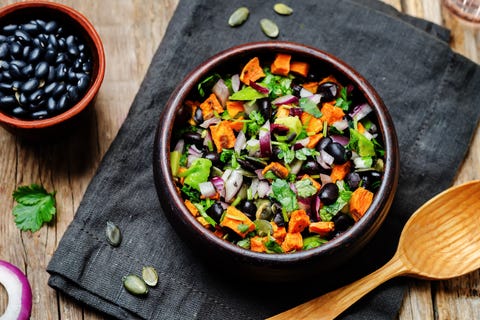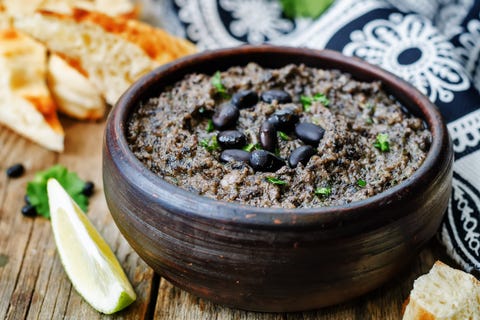They're three times cheaper than chicken, beef, or fish, and loaded with with fiber, folate, potassium, and protein. Black beans can fill you up without draining your wallet, and now they're trendier than ever. (Thanks, Instant Pots!)
The United Nations even declared 2016 the International Year of Pulses, a.k.a. the dry, edible seed of beans, lentils, chickpeas, and peas. Ever since, we’ve seen a major takeover in beans as a main ingredient in recipes, especially since they can replace less-nutritious refined grains. Here's everything you need to know these health-boosting powerhouses.
Nutrition Stats
Serving Size: 1 cup canned low-sodium black beans
- 218 calories
- 14.5 g protein
- 0.7 g fat
- 40 g carbohydrates
- 1 g sugar
- 16.6 g fiber
- 5 mg iron (28% DV)
- 84 mg magnesium (27%)
- 259 mg phosphorus (37%)
- 739 mg potassium (16%)
- 331 mg sodium (22%)
- 1.3 mg zinc (16%)
- 0.4 mg thiamin (33%)
- 0.3 mg riboflavin (27%)
- 146 µg folate (36%)
Health Benefits of Black Beans
Besides protein, black beans provide lots of soluble and insoluble fiber — both of which can decrease your risk of many chronic diseases and help you stay fuller, longer. Here are just a few other benefits that come with eating black beans:
- Less constipation and bloating: The fiber helps you stay regular.
- Lower "bad" cholesterol levels: Eating adequate fiber (at least 25 to 35 grams per day) can help decrease LDL cholesterol levels and reduce your risk of heart disease.
- Protection for your bones: The magnesium in black beans plays a role in over 300 enzymatic reactions in the body including metabolism, and it's key for bone health as well.
- Healthier blood pressure levels: The potassium in black beans can help improve your numbers.
Get the low-down on your other questions about black beans below:
Are black beans a good source of protein?
Yes! Just one cup contains 15 grams. In fact, the U.S. Dietary Guidelines for Americanscounts black beans as both a vegetable and a protein — double duty! Beans provide some of the most protein compared to other plant-based foods. Plus, buying dry beans is extremely cost-effective compared to relying on chicken, beef, or fish.
How much should I eat?
Eating black beans as part of a balanced diet can decrease your risk of diabetes, heart disease, and some cancers. One of the commonalities between “blue zones” — the places on Earth where people live the longest — is the consumption of beans.
For this reason, the U.S. Dietary Guidelines for Americans recommends eating 3 cups of legumes or beans per week. Eating 1/2 cup of beans every day will help you meet your weekly goal.
Are beans good for diabetics?
You bet. The combo of plant-based protein and fiber can help slow the glycemic response to any meal, so people with diabetes will experience fewer spikes and crashes in blood sugar and maintain tighter glycemic control.
Even if you're not diabetic, swapping starches and refined grains for these complex carbs will help you maintain steadier energy levels.
Don’t beans make you gassy?
Not exactly. The main reason why most of us feel gassy after eating beans is because we don’t normally eat that much fiber all in one sitting, making it a tad, er, surprising to your GI tract!
However, the more you regularly you incorporate beans into your daily meals and snacks, the less gas you'll experience. Beans actually contain resistant starch that feeds the good bacterium (a.k.a. probiotics) in your gut and helps them thrive. If you’re new to eating a lot of fiber, start incorporating it gradually into your diet and drink plenty of water to avoid discomfort.
Is there a difference between canned and dried beans?
Nutritionally, canned and dry beans are the same. The largest difference is that canned beans may contain more sodium, so you’ll have to check labels and look for alternatives that say “salt-free," "low sodium," or "not salt added." Aim for under 140 mg of sodium or less per serving or rinse canned beans in a colander before using them.
While they take longer to prepare, dried beans have some benefits too. They're lower in price and easier to buy in bulk. Try them in soups, stews, and slow-cooker recipeswhere they cook with the dish. Regardless, both forms of beans are a great choice.
Are black beans better than other beans?
All beans are excellent since they’re nutrient-dense and super filling. However, black beans pack a little more fiber and magnesium than their counterparts, so they’ve got a leg-up on some other legumes.
How can I add more beans to my diet?
Make snacks out of beans? You bet! Chips like Beanitos (a Good Housekeeping Nutritionist Approved Emblem holder) make it easier eat more beans on-the-go. Otherwise, cook them up in chili, salads, soups, and dips. Try four of our favorite recipes below:
- Sweet Potato, Avocado and Black Bean Tacos
- Avocado and Lime Bean Bowl
- Pepper and Black Bean Salad With Citrus Dressing
- White Chili With Black Beans
Watch Next
A Chiropractor Just Explained How to Carry a Car Seat Without Back Pain








No comments:
Post a Comment